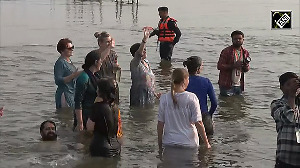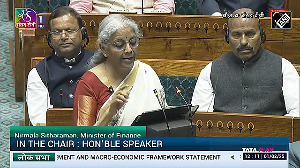At least 78 persons, most of them civilian workers in a cluster of arms production factories located in the heavily-protected cantonment area of Wah, about 30 km from Islamabad, were reported to have been killed on the afternoon of August 21 when two suicide bombers blew themselves up outside different gates of the factories during shift change.
The ease with which they penetrated this high security area would indicate either that they had accomplices in the security staff or that they were workers of one of the factories who had no difficulty in entering the complex. If suicide bombers could penetrate such a high-security area with so much ease, it should be equally easy for other terrorists to penetrate Pakistan's nuclear establishments one day. The expression 'high security' has ceased to have any meaning in Pakistan's sensitive establishments because of the penetration by the jihadi elements.
This is the third suicide attack in the non-tribal areas since the elected coalition government headed by Yousef Raza Gilani assumed office on March 18. The previous two targeted the Danish embassy in Islamabad (June 2) in protest against the publication by some Danish newspapers of caricatures of the Holy Prophet, and policemen who were returning to their stations after performing duty at the Lal Masjid in which a meeting was held (July 6) in memory of those killed during the commando raid in July last year.
The blasts in Wah came in the wake of the threat issued by the Tehrik-e-Taliban Pakistan to resume terrorist attacks in the non-tribal areas if the government did not stop the on-going military operations in the Bajaur Agency, where many leaders and cadres of Al Qaeda and the Afghan Taliban have reportedly taken shelter. Since the threat was issued by the TTP, the Pakistan Army has not been much active on the ground in the Bajaur Agency either by itself or through the paramilitary Frontier Corps. However, helicopter gunships of the army and the planes of the air force have stepped up their air strikes in response to the US pressure to neutralise the terrorist infrastructure in the area, which was making the NATO forces in Afghanistan bleed.
Making a statement in the NWFP provincial Assembly on August 21, Chief Minister Amir Haider Khan Hoti said thousands of foreign militants were present in the Bajaur Agency and claimed they would have captured the area if the military operation had been delayed for a couple of days.
According to him, in the past, the two traditional pillars of power in the tribal belt were the political administration and the Malik (tribal chief) system. He said a third pillar, inducted into the area during the 1980s, had emerged stronger than the traditional pillars. He added that some called this third pillar the Mujahideen, some others called it the Taliban and yet some others termed it Al Qaeda. It was this third pillar which was now dominating the tribal belt.
According to him, there cannot be peace in the NWFP without peace in the Federally Administered Tribal Areas and there cannot be peace in FATA without peace in Afghanistan. The ground situation in Afghanistan, FATA and the NWFP was closely inter-connected. He said before launching the military operation in the Bajaur Agency, the government had sent a delegation for talks with the local tribals, but there were thousands of Arabs, Uzbeks and Chechens in the area who are unaware of the Pashtun traditions and customs and came in the way of peace.
In retaliation for the air strikes, the TTP blew up an air force bus on Kohat Road in the NWFP on August 12 killing 13 persons, including seven administrative personnel of the PAF, and followed this up on August 19 with an explosion outside the district headquarters hospital of Dera Ismail Kahan in the NWFP, in which 32 persons, many of them Shia outdoor patients, were killed. The TTP claimed responsibility for both these attacks and projected them as being in retaliation for the continuing air strikes in the Bajaur Agency.
While the targeting of the PAF bus is explained by the anger of the TTP over the air strikes, its targeting of Shia outdoor patients is attributed by well-informed police sources to its strong suspicion that the Shias of the NWFP and the Kurram Agency of FATA have been collaborating with the Pakistan Army in its operations against the Taliban and Al Qaeda. Over 100 persons -- more Shias than Sunnis -- have been killed in continuing Shia-Sunni clashes in the Kurram Agency for the last 10 days.
While the attacks of August 12 and 19 were in the tribal areas, the attacks in Wah on August 21 were in a non-tribal area. The TTP has already admitted responsibility for the suicide attacks in Wah and warned of similar attacks on military installations in other cities including Lahore, Karachi, Islamabad and Rawalpindi if the government does not stop the air strikes in the Bajaur Agency and withdraw the Army from the Agency and the Swat Valley of the NWFP. The government has to take these threats seriously in view of the repeatedly demonstrated capability of the TTP to strike at military targets in non-tribal areas since the commando action in the Lal Masjid of Islamabad from July 10 to 13, 2007.
The anger of the TTP, the Afghan Taliban and Al Qaeda against the Pakistan Army has not subsided as a result of the resignation of Pervez Musharraf from the post of president on August 18. They hold Musharraf as well as the army responsible for the commando action in Lal Masjid and for the military operations in the tribal belt, which they view as undertaken to protect Western lives and in support of the NATO operations in Afghanistan. They are demanding not only the stoppage of all air strikes in the tribal belt and the withdrawal of the army from there, but also the stoppage of any co-operation with the US and other NATO forces against the Afghan Taliban.
It is only a question of time before the anti-Musharraf and anti-Army anger for their co-operation with the US broadens to include anti-Asif Zardari anger for the continuing co-operation with the US. The terrorists view Zardari as no different from Musharraf and as much an apostate as Musharraf. They are convinced that the air strikes and ground operations in the Bajaur Agency have been agreed to by Zardari and Gilani as a quid pro quo for the role of the US and the UK in persuading Musharraf to quit as president.
FATA is emerging as Pakistan's Fallujah. After the US occupation of Iraq, Fallujah became the launching pad of terrorist strikes in the rest of Iraq -- whether by Al Qaeda or by ex-Baathist resistance fighters. Only after the US ruthlessly pacified Fallujah and destroyed the terrorist launching pads there, did it start making progress in its counter-insurgency operations in the rest of the Sunni areas of Iraq.
The NATO forces will continue to bleed in Afghanistan and the jihadi virus will continue to spread in Pakistan unless and until FATA is similarly pacified through ruthless application of force. The Pakistan Army has not demonstrated either the will or the capability to do so. A more active role by the NATO forces under US leadership is necessary -- either covertly or openly. A strategy for a Fallujah-style pacification of FATA is called for -- with the co-operation of the Pakistan Army if possible and without it, if necessary.
The USSR was defeated by the Afghan Mujahideen in the 1980s because of the reluctance of the Soviet troops to attack their sanctuaries in FATA and NWFP. India has been unable to prevail over cross-border jihadi terrorism because of the reluctance of its leadership to attack their sanctuaries in Pakistani territory. The US is unlikely to prevail over the Taliban and Al Qaeda in Afghanistan unless it is prepared to destroy their infrastructure in FATA.
Deniable Predator air strikes by the US intelligence agencies on suspected terrorist hide-outs in the FATA have been increasing and some of them have been effective in neutralising well-known Al Qaeda operatives. But air strikes alone will not be able to turn the tide against the jihadis. Effective hit and withdraw raids into FATA in the form of hot pursuit should be the next step. The longer it is delayed the more will be the bleeding.
(The writer is Additional Secretary (retired), Cabinet Secretariat, Government of India, New Delhi, and, presently, Director, Institute For Topical Studies, Chennai. E-mail: seventyone2@gmail.com)






 © 2025
© 2025